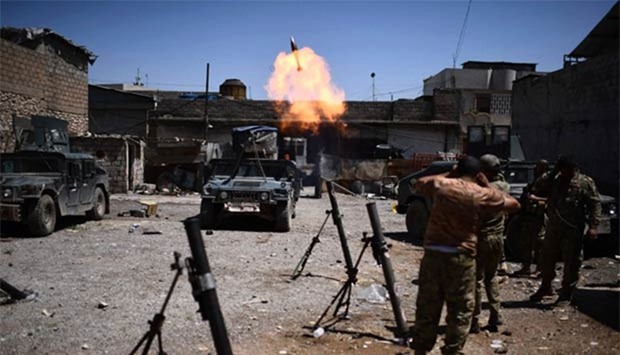Iraqi forces have recaptured nearly 90 percent of west Mosul from the Islamic State group after retaking the city's eastern side earlier this year, a military spokesman said on Tuesday.
IS still controls ‘10.5 percent of... the right bank,’ Brigadier General Yahya Rasool, spokesman for the Joint Operations Command, told a news conference in Baghdad, referring to west Mosul.
Mosul is split by the Tigris River, and its western side is referred to as the right bank, while the east is known as the left bank.
Iraqi forces launched the massive operation to retake Mosul from IS nearly seven months ago, fighting their way to the jihadist-held city, retaking its eastern side and then attacking the west.
The drive to retake Mosul has been supported by US-led air strikes that have aided the Iraqi advance but which have also reportedly caused hundreds of civilian casualties in the city.
‘More than 300 vehicle-borne improvised explosive devices (car bombs) have been destroyed by coalition strikes in Mosul,’ coalition spokesman Colonel John Dorrian told the news conference.
IS now controls just a handful of neighbourhoods around the Old City, one of the country's heritage jewels.
The area's narrow streets and closely spaced buildings make it difficult for federal forces to take on the jihadists, requiring them to fight on foot instead of from vehicles as they have previously done.
Half a million people are currently displaced as a result of the battle for Mosul, and some 250,000 civilians are estimated to be still trapped inside the city's west.
Thursday saw what the Norwegian Refugee Council said was the biggest single-day displacement since the start of the operation, with around 20,000 people fleeing west Mosul.
The presence of a large civilian population, which either chose not to leave or was prevented from doing so by IS, complicates any final assault to seal victory in Mosul.
Human shields have become a central feature of the vastly outnumbered jihadists' defences, and IS has stopped at nothing to deter people from escaping the city, including killing people who seek to flee.
But that is not the only threat: trapped residents reached by AFP inside IS-held areas have recently warned that hunger was starting to kill more people than the fighting.
In eastern Mosul, life returned to a semblance of normality fairly quickly after Iraqi forces drove the jihadists back neighbourhood by neighbourhood until the area was fully recaptured earlier this year.
The city's first post-IS liquor store has since been opened in east Mosul, and is doing brisk business among people who were denied easy access to alcohol for more than two years.
IS overran large areas north and west of Baghdad in 2014, but Iraqi forces backed by US-led air strikes have since retaken much of the territory they lost to the jihadists.

